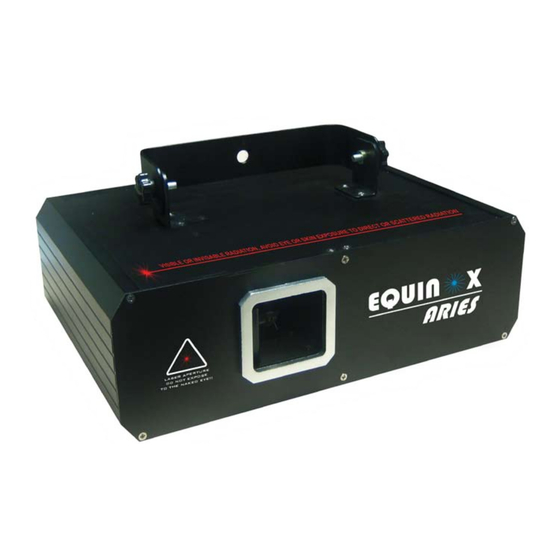
Advertisement
Quick Links
Advertisement

Summary of Contents for Equinox Systems ARIES EQLA20
- Page 1 ARIES Order code: EQLA20 user manual...
-
Page 2: Safety Instructions
Equinox Aries Laser Safety WARNING FOR YOUR OWN SAFETY, PLEASE READ THIS USER MANUAL CAREFULLY BEFORE YOUR INITIAL START-UP! CAUTION! Keep this equipment away from rain, moisture and liquids. SAFETY INSTRUCTIONS Every person involved with the installation, operation & maintenance of this equipment should: Be competent Follow the instructions of this manual... -
Page 3: Operating Determinations
Equinox Aries Laser Safety IMPORTANT: The manufacturer will not accept liability for any resulting damages caused by the non-observance of this manual or any unauthorised modification to the equipment. • Never let the power-cable come into contact with other cables. Handle the power-cable and all mains voltage connections with particular caution! •... - Page 4 Equinox Aries Laser Technical specifications You should find inside the Laser carton the following items: 1, Aries Laser 2, Power cable 3, Instruction manual Technical Specifications: DMX channels: 16 Laser diodes: 1 x 70mW Green (532nM), 1 x 130mW Red (650nM) DPSS laser High speed scanner with extra wide scanner angle Operating modes: 1, Sound Activated 2, Auto Run...
- Page 5 Equinox Aries Laser Operation modes Operation modes: The Taurus has fours modes of operation as follows: 1, Sound active mode To select sound active mode set all dipswitches to OFF. You can now use the sensitivity control on the back panel to set the required sound level. With no music present, the laser diodes will turn OFF and will come back ON as soon as the music starts again.
- Page 6 Equinox Aries Laser DMX control mode DMX Control Mode Operating in a DMX control mode environment gives the user the greatest flexibility when it comes to customising or creating a show. In this mode you will be able to control each individual trait of the fixture and each fixture independently.
- Page 7 Equinox Aries Laser DMX set up DMX-512: • DMX (Digital Multiplex) is a universal protocol used as a form of communication between intelligent fixtures and controllers. A DMX controller sends DMX data instructions form the controller to the fixture. DMX data is sent as serial data that travels from fixture to fixture via the DATA “IN”...
- Page 8 Equinox Aries Laser DMX Set Up Notice: • Be sure to follow figures 2 & 3 when making your own cables. Do not connect the cable’s shield conductor to the ground lug or allow the shield conductor to come in contact with the XLR’s outer casing.
- Page 9 Equinox Aries Laser Dip Switch Reference Chart DMX Dip Switch Quick Reference Chart Dip Switch Position Dip Switch position DMX Address...
- Page 10 Equinox Aries Laser Safety Class 3B Laser Safety Guide Warning Class 3B Lasers have the potential to harm eyesight if viewed directly and can also be harmful at long distances. Any unit that contains a laser diode has to be classified depending upon the light output that someone may be exposed to.
- Page 11 Equinox Aries Laser Safety Licensing and Laws There are no U.K. “laser laws” or any “laser licenses” that need to be obtained in order to own or operate a laser for lightshow use. Detailed and specific guidance is issued by the Health and Safety Executive in the form of a book called HS(G)95 The Radiation Safety of Lasers Used for Display Purposes.
- Page 12 Equinox Aries Laser Safety Laser Safety Officer The BS/EN60825-1 Laser Safety Standard recommends that all venues that use, or businesses that work with Class 3B laser products, should appoint a Laser Safety Officer (LSO). The Laser Safety Officer should be aware of the many safety issues when using lasers, and will also be responsible for overseeing how the laser is used.
- Page 13 Equinox Aries Laser Safety Hazard Distances All lasers for display porposes feature a characteristic called the hazard distance for direct viewing (NOHD). The (NOHD) is distance at which viewing the laser directly is no longer considered a hazard. Note at any point between the laser unit and the calculated hazard distance, it may be hazardous to directly view the laser beams.
















Need help?
Do you have a question about the ARIES EQLA20 and is the answer not in the manual?
Questions and answers